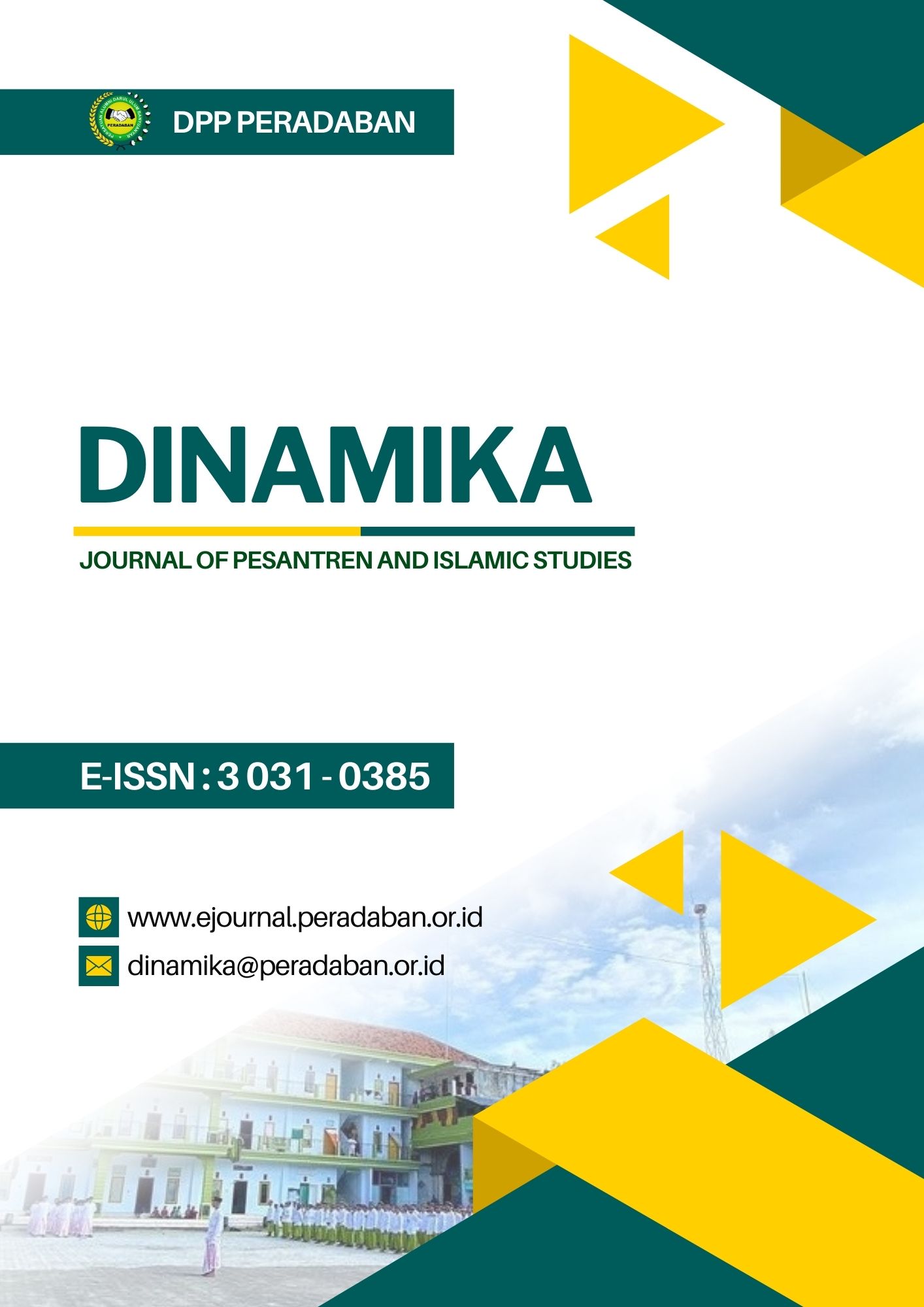DIGITALISASI PENDIDIKAN AGAMA MELALUI WASATHA: APLIKASI MODERASI BERAGAMA BERBASIS DIGITALDALAM BINGKAI WAWASAN TAFSIR NUSANTARA
Kata Kunci:
Wasatha; application; moderation; interpretation; Nusantara.Abstrak
Religious moderation has been widely promoted by religious scholars in Indonesia; however, public access to a comprehensive and conceptual understanding of religious moderation remains limited. Strengthening religious moderation must now be enhanced through the education sector. Islamic boarding schools (pesantren), as modern and integrated institutions that foster and shape the nation’s character, play a crucial role in this process and must be fully utilized. In this context, this study proposes a new framework for implementing religious moderation in society through a digital application called “Wasatha.” This initiative serves as a preventive step to promote public understanding of religious moderation via digital means, including the digitization of the archipelago’s (Nusantara) interpretive traditions. The study employs a conceptual qualitative method with three approaches: descriptive analysis for writing, literature review for data presentation, and the waterfall technique for designing the application's structure. The Wasatha app offers new insights through its features, including perspectives on religious moderation by the Ministry of Religious Affairs and national figures, interpretations of religious moderation, a map of worship places across religions in Indonesia, a Religious Moderation House (RMB) feature, and historical context. This research is expected to offer a new direction for implementing and teaching religious moderation in Indonesian society through the Wasatha application.
Referensi
Afadlal, S., Riza, T., & Endang. (2005). Islam dan Radikalisme Di Indonesia. Jakarta: LIPI Press.
Agama, K. (2007). Al-Qur’an dan Tafsirnya (edisi yang disempurnakan). Jakarta: Kementerian Agama RI.
Agama, K. (2019). Moderasi Beragama Kemenag RI. In Badan Litbang dan Diklat Kementerian Agama RI Gedung Kementerian Agama RI Jl.MH. Thamrin No.6 Lt. 2 Jakarta Pusat.
Al-Singkili, S. A.-R. (1981). Tarjuman al-Mustafid, semakan: Syeikh Muhammad Idris Abdul Rauf al-Marbawi, cetakan keempat. . Singapura: Pustaka Nasional.
Baidan, N. (2002). Sejarah Perkembangan Tafsir di Indonesia. In Yogyakarta: Tiga Serangkai. Corneloup, S., & Verhellen, J. (2021). SDG 16 : PEACE , JUSTICE AND STRONG
INSTITUTIONS. Intersentia, 505–540.
Darmalaksana, W. (2020). Metode Penelitian Kualitatif Studi Pustaka dan Studi Lapangan.
PrePrint Digital Library UIN Sunan Gunung Djati Bandung, 1–6.
HAMKA. (2004). Tafsir Al-Azhar Jilid 4 Juz 8-11. Jakarta: Pustaka Panjimas.
Jhon, L. Esposito. (2010). Islam The Straight Path, Ragam Ekspresi Menuju Jalan Lurus.
Jakarta: Paramadina.
Junaedi, E. (2019). Inilah Moderasi Beragama Perspektif Kemenag. Harmoni, 18(2), 182–
https://doi.org/10.32488/harmoni.v18i2.414
Maharani, M. D. (2021, September). Merumuskan Tafsir Nusantara (1): Islah Gusmian Sebagai Peletak Dasar. Studitafsir.Com (Blog).
Maimun, & Kosim, M. (2019). Moderasi Islam Di Indonesia (F. Haris (ed.); Cetakan I).
LKIS. http://www.lkis.co.id
Mudjia, R. (2017). Studi Kasus dalam Penelitian Kualitatif: Konsep dan Prosedurnya. UIN Maulana Malik Ibrahim Malang.
Muhammad, A. (2020). Moderasi Beragama dalam Bingkai Toleransi ( Kajian Islam dan Keberagaman ). Rusydiah, 1(1), 137–148.
Musthofa, B. (n.d.). al-Ibriz li Ma’rifat Tafsir al-Qur’an al-‘Aziz, Juz 17. Kudus: Menara Kudus.
Musthofa, M. (2002). Tafsir Al-Iklil FI Ma'ani Al-Tanzil. Surabaya: Maktabah Insan.
Nisa, M. K., Yani, A., Andika, A., Yunus, E. M., & Rahman, Y. (2021). BERAGAMA: Landasan Moderasi dalam Tradisi berbagai Agama dan Implementasi di Era Disrupsi Digital. Jurnal Riset Agama, 1(3), 79–96.
https://doi.org/10.15575/jra.v1i3.15100
Nawawi Muhammad, I. '. (n.d.). Marah Labid li Kasyfi Ma’na Quran. Beirut: Dar al Kutub al Islamiyah.
Purnia, D. S., Rifai, A., & Rahmatullah, S. (2019). Penerapan Metode Waterfall dalam Perancangan Sistem Informasi Aplikasi Bantuan Sosial Berbasis Android. Seminar Nasional Sains Dan Teknologi 2019, 1–7.
Saleh, S. (2017). Analisis Data Kualitatif (1st ed.). Pustaka Ramadhan.
Shihab, M. Q. (2003). Tafsir Al-Misbah: Pesan, Kesan dan Keserasian Al-Qur'an, Jilid 5.
Jakarta: Lentera Hati.
Wijaya, A. (2015). Menusantarakan Islam: menelusuri jejak pergumulan Islam yang tak kunjung usai di Nusantara. Nadi Pustaka.
Husna, Asmaul, Hepi Ikmal, dan Ach Sayyi. 2025. “Konsep Scaffolding dalam Perspektif Pendidikan Islam: Analisis Pemikiran Ibnu Khaldun dan Vygotsky.” Akademika 19 (1). https://scholar.google.com/scholar?cluster=11540258644672899044&hl=en&oi=scholarr.
Sayyi, Ach. 2024. “Transformasi Pendidikan Islam: Moderasi Beragama Dalam Tradisi Pesantren Salaf Di Era Global.” Akademika 18 (2): 56–70. https://scholar.google.com/scholar?cluster=13143895834670257186&hl=en&oi=scholarr.
Sayyi, Ach, Abdul Gaffar, dan Shofiyatun Nisak. 2023. “Transformation Of Islamic Religious Education: An Analysis Of The Implementation Of The Independent Curriculum In Class VII SMPN 3 Pamekasan.” Molang: Journal Islamic Education 1 (02): 15–28. https://pdfs.semanticscholar.org/88f6/636b6737b39e7e394e23319bcced5f456a1f.pdf.
Sayyi, Ach, Moh Subhan, Shahibul Muttaqien Al-Manduriy, dan Rofiqi Rofiqi. 2021. “Management Model of Kitab Kuning Reading Acceleration Program at Mambaul Ulum Islamic Boarding School, Bira Timur Sampang.” FIKROTUNA: Jurnal Pendidikan dan Manajemen Islam 13 (01). https://core.ac.uk/download/pdf/478602873.pdf.
Unduhan
Diterbitkan
Versi
- 2025-07-12 (2)
- 2025-07-12 (1)
Terbitan
Bagian
Lisensi
Hak Cipta (c) 2025 Dinamika: Jurnal Studi Kepesantrenan dan Keislaman

Artikel ini berlisensi Creative Commons Attribution 4.0 International License.









